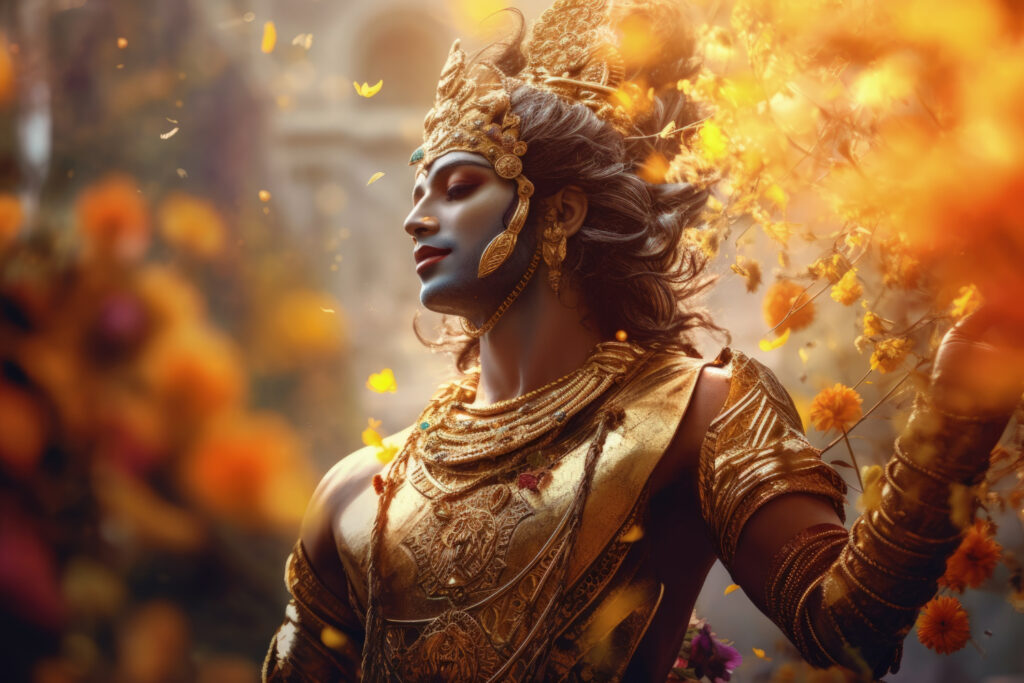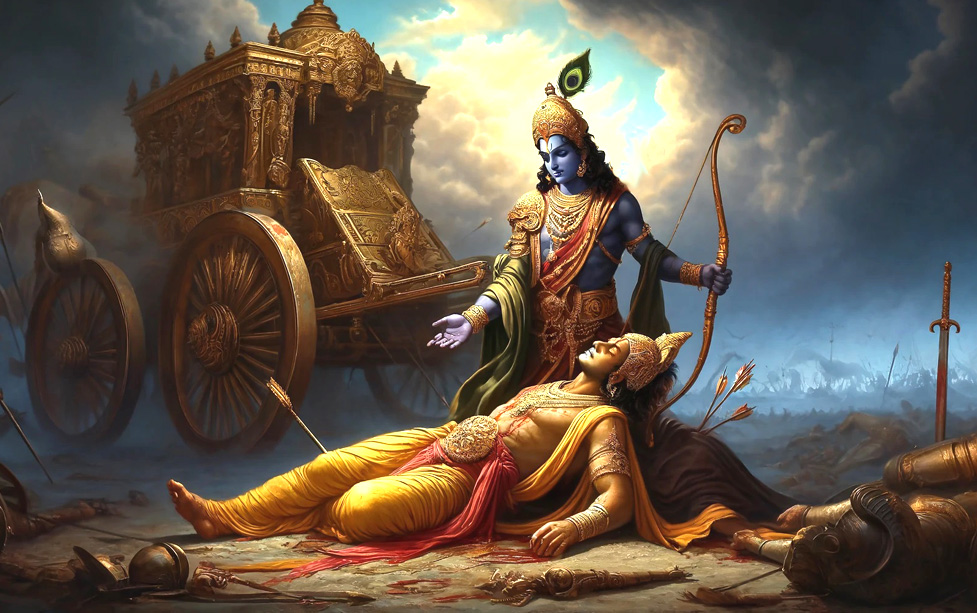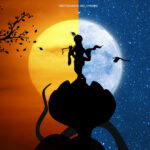Karna is one of the most complex and tragic characters in the Mahabharat. Born to Princess Kunti through the boon of the sun god, Karna was abandoned at birth and raised by a charioteer’s family. Despite being a skilled warrior and an unmatched archer, Karna faced societal rejection due to his lower status. His loyalty to Duryodhana, the Kaurava prince, led him to fight against his own brothers, the Pandavas. Known for his generosity, courage, and adherence to dharma, Karna’s life was marked by sacrifice, and his ultimate death at the hands of Arjuna remains one of the epic’s most poignant moments.
Arjuna, one of the five Pandava brothers in the Mahabharat, is known for his exceptional skills as an archer and warrior. A central figure in the epic, Arjuna is a symbol of righteousness, courage, and dedication. Trained by Guru Dronacharya, he excelled in martial arts and archery, becoming the greatest archer of his time. Arjuna’s role in the Kurukshetra War is crucial, where he fights for justice and the protection of dharma. His inner conflict and doubts are famously addressed by Lord Krishna in the Bhagavad Gita, where he receives guidance on duty, righteousness, and spirituality.
The Mahabharat: Understanding the Key Characters and Their Roles

The Mahabharat, an ancient Indian epic, revolves around the Kurukshetra War and the complex relationships between its characters. Key figures in the narrative are:
- Arjuna: One of the Pandava brothers, Arjuna is a skilled warrior and the hero of the epic. He is known for his bravery and devotion, guided by Lord Krishna during the war. His dilemma on the battlefield, depicted in the Bhagavad Gita, explores the moral and ethical challenges of war.
- Lord Krishna: Serving as Arjuna’s charioteer, Krishna is a divine figure who provides spiritual guidance, offering deep insights into life, duty, and righteousness in the Bhagavad Gita. He plays a crucial role in the Pandavas’ victory.
- Yudhishthira: The eldest Pandava, known for his righteousness, Yudhishthira struggles with decisions of duty and justice. He is often depicted as a paragon of virtue, though his adherence to truth leads to personal suffering.
- Duryodhana: The main antagonist, Duryodhana is the eldest Kaurava. His ambition to rule and his jealousy towards the Pandavas lead to the war. His character is marked by arrogance, pride, and a refusal to negotiate peace.
- Draupadi: The wife of the five Pandavas, Draupadi is a pivotal figure who endures immense suffering. Her humiliation in the Kaurava court serves as one of the main catalysts for the war.
These characters, among others, embody various aspects of dharma, justice, and morality, making the Mahabharat a profound exploration of human nature.
The Mahabharat, an ancient Indian epic, revolves around the Kurukshetra War and the complex relationships between its characters. Key figures in the narrative are:
- Arjuna: One of the Pandava brothers, Arjuna is a skilled warrior and the hero of the epic. He is known for his bravery and devotion, guided by Lord Krishna during the war. His dilemma on the battlefield, depicted in the Bhagavad Gita, explores the moral and ethical challenges of war.
- Lord Krishna: Serving as Arjuna’s charioteer, Krishna is a divine figure who provides spiritual guidance, offering deep insights into life, duty, and righteousness in the Bhagavad Gita. He plays a crucial role in the Pandavas’ victory.
- Yudhishthira: The eldest Pandava, known for his righteousness, Yudhishthira struggles with decisions of duty and justice. He is often depicted as a paragon of virtue, though his adherence to truth leads to personal suffering.
- Duryodhana: The main antagonist, Duryodhana is the eldest Kaurava. His ambition to rule and his jealousy towards the Pandavas lead to the war. His character is marked by arrogance, pride, and a refusal to negotiate peace.
- Draupadi: The wife of the five Pandavas, Draupadi is a pivotal figure who endures immense suffering. Her humiliation in the Kaurava court serves as one of the main catalysts for the war.
These characters, among others, embody various aspects of dharma, justice, and morality, making the Mahabharat a profound exploration of human nature.
The Greatness of Arjuna in the Mahabharat: A Hero’s Journey
Arjuna, one of the central figures in the Mahabharat, is often regarded as the greatest warrior of his time. His greatness is defined not only by his unparalleled skills in archery and warfare but also by his unwavering devotion to duty and righteousness. As a key figure in the Kurukshetra War, Arjuna’s journey is a tale of courage, inner conflict, and spiritual awakening.
His character is complex—while a fierce warrior, Arjuna grapples with moral dilemmas, especially when faced with the prospect of fighting against his own kin. This inner turmoil is highlighted in the Bhagavad Gita, where Lord Krishna imparts divine wisdom, guiding Arjuna to understand his true purpose.
Arjuna’s devotion to dharma, combined with his commitment to righteousness, makes him a symbol of idealism. His heroism extends beyond battlefields, as he demonstrates the importance of moral integrity and spiritual growth in the Mahabharat.

The Unmatched Greatness of Karna in the Mahabharat: A Hero’s Journey
Karna, one of the most compelling characters in the Mahabharat, stands out for his unmatched greatness and tragic journey. Born to the unmarried Kunti, he is raised by a charioteer’s family, which sets the stage for a life full of adversity and hardship. Despite his humble beginnings, Karna becomes a formidable warrior, renowned for his unmatched skills with the bow and arrow.
Karna’s loyalty to his friend Duryodhana, the eldest Kaurava, is central to his story. His unwavering support for Duryodhana, despite knowing the injustices he perpetuates, showcases his commitment to friendship and honor. His greatest qualities—courage, generosity, and resilience—are evident throughout his life.
However, Karna’s journey is marked by tragic circumstances. He is unaware of his royal lineage until later in life, which adds to the complexity of his character. Despite his valiant efforts in the Kurukshetra War, where he faces off against some of the greatest warriors, Karna’s fate is sealed by a series of tragic events, including a curse that weakens him in his most critical moments.
Karna’s legacy in the Mahabharat is one of unmatched valor, loyalty, and a hero’s tragic destiny, making him one of the most revered and misunderstood characters in Indian mythology, admired by many in cities like Surat.

The conclusion of the Mahabharat war, fought on the fields of Kurukshetra, marks the end of a devastating conflict between the Pandavas and Kauravas. After 18 days of intense battles, the Pandavas emerge victorious, but at a great cost. The war results in the death of nearly all the Kauravas, including Duryodhana, and many revered warriors, including Karna, Bhishma, and Drona. The destruction is overwhelming, with countless lives lost and the kingdom in ruins.
The victory, however, is bittersweet for the Pandavas. They have reclaimed their kingdom but are burdened by the immense loss of life and the moral dilemmas surrounding the war. Yudhishthira, the eldest Pandava, is crowned king, but his sorrow over the carnage leads to his eventual renunciation of the throne. The epic concludes with the Pandavas’ journey to the Himalayas, seeking spiritual liberation, thus marking the end of an era. The Mahabharat is a profound exploration of duty, justice, and the complexities of war.




Pingback: Exploring the Timeless Wisdom of the Mahabharat - Pandaloons